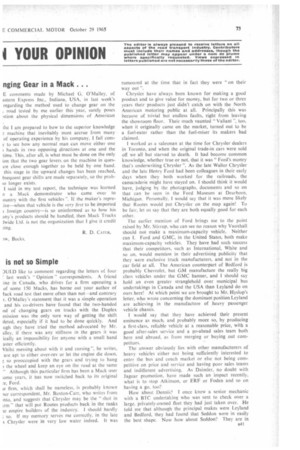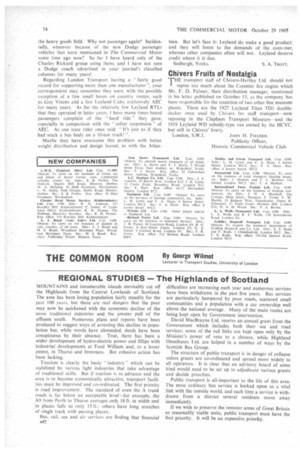YOUR OPINION
Page 75

Page 76

If you've noticed an error in this article please click here to report it so we can fix it.
The editor is always pleased to receive letters on all aspects of the road transport industry, Contributors must include their names and addresses, though the published letter may appear under a nom de plume where specifically requested. Views expressed in letters published are not necessarily those of the editor.
nging Gear in a Mack ...
E comments made by Michael G. O'Malley, of astern Express Inc., Indiana, USA, in last week's regarding the method used to change gear on the road tested by me earlier this year, surely poses .stion about the physical dimensions of American ilst I am prepared to bow to the superior knowledge machine that inevitably must accrue from many of operating experience by his company. I fail corny to see how any normal man can move either one ; hands in two opposing directions at one and the time. This, after all, is what must be done on the only ion that the two gear levers on the machine in quesire close enough together to be held by one hand. this stage in the upward changes has been reached, bsequent gear shifts are made separately, so the probio longer exists.
I said in my test report, the technique was learned n a Mack demonstrator who came over to ountry with the first vehicles ". If the maker's reprelye—when that vehicle is the very first to be imported t foreign country—is so uninformed as to how his any's products should be handled. then Mack Trucks Jwide Ltd. is not the organization that I give it credit :ing.
R. D. CATER. )w, Bucks.
is not so Simple
JULD like to comment regarding the letters of four last week's Opinion correspondents. A friend me in Canada. who drives for a firm operating a of some 150 Macks, has borne out your author of lack road test that more often than not—and contrary r. O'Malley's statement that it was a simple operation and his co-drivers have found that the two-handed od of changing gears on trucks with the Duplex mission was the only sure way of getting the shift )leted, especially if it had to be done quickly, And ugh they have tried the method advocated by Mr. Alley. if there was any stiffness in the gears it was ically an impossibility for anyone with a small hand aster efficiently.
Vhilst messing about with it and cursing ", he writes, are apt to either over-rev or let the engine die down. ; so preoccupied with the gears and trying to hang ) the wheel and keep an eye on the road at the same " Although this particular firm has been a Mack user ome years, it has now switched back to its original ;e, Ford.
le firm, which shall be nameless, is probably known )ur correspondent. Mr. Buxton-Carr, who writes from PM°, and suggests that Chrysler may be the "shot in rm " that will put Rootes products back in the ranks le empire builders of the industry. I should hardly : so. If my memory serves me correctly. in the late s Chrysler were in very low water indeed. It was rumoured at the time that in fact they were "on their Way out ".
Chrysler have always been known for making a good product and to give value for money, but for two or three years their products just didn't catch on with the North American motoring public at all. Principally this was because of trivial but endless faults, right from leaving the showroom floor. Their much vaunted "Valiant ", too, when it originally came on the market, turned out to be a fuel-eater rather than the fuel-miser its makers had claimed.
I worked as a salesman at the time for Chrysler dealers in Toronto, and when the original trade-in cars were sold off we all but starved to death. It had become common knowledge, whether true or not, that it was " Ford's money that's underwriting Chrysler ". As the late Walter Chrysler and the late Henry Ford had been colleagues in their early days when they both worked for the railroads, the camaraderie might have stayed on. I should think it would have, judging by the photographs, documents and so on that can be seen in the Ford Museum at Dearborn, Michigan. Personally. I would say that it was more likely that Rootes would put Chrysler on the map again! To be fair, let us say that they are both equally good for each other.
The earlier mention of Ford brings me to the point raised by Mr. Stirrup, who can see no reason why Vauxhall should not make a maximum-capacity vehicle. Neither can I. Ford and GMC, in the United States, both make maximum-capacity vehicles. They have had such success that their competitors. such as International, White and SO on, would mention in their advertising publicity that they were exclusive truck manufacturers, and not in the car field at all. The American counterpart of Bedford is probably Chevrolet, but GM manufacture the really big class vehicles under the GMC banner, and I should say hold an even greater stranglehold over municipal bus undertakings in Canada and the USA than Leyland do on ours here! At which point we are brought to Mr. Hyslop's letter, who wrote concerning the dominant position Leyland are achieving in the manufacture of heavy passenger vehicle chassis.
I would say that they have achieved their present eminence as much, and probably more so, by producing a first-class, reliable vehicle at a reasonable price, with a good after-sales service and a go-ahead sales team both here and abroad, as from merging or buying out competitors.
The answer obviously lies with other manufacturers of heavy vehicles either not being sufficiently interested to enter the bus and coach market or else not being competitive on price and service and having poor sales teams and indifferent advertising. As Daimler, no doubt with Jaguar promotion, have made such an impact recently, what is to stop Atkinson, or ERF or Foden and so on having a go. too?
How about Dennis? I once knew a senior mechanic with a BTC undertaking who was sent to check over a large. privately-owned fleet they had just taken over. He told me that although the principal makes were Leyland and Bedford, they had found that Seddon were in easily the best shape. Now how about Seddon? They are in the heavy goods field. Why not passenger again? Incidentally, whatever became of the new Dodge passenger vehicles that were mentioned in The Cotnmercial Motor some time ago now? So far I have heard only of the Charles Rickard group using them, and I have not seen a Dodge coach advertised in your journal's classified columns for many years!
Regarding London Transport having a "fairly good record for supporting more than one manufacturer ", your correspondent may remember they were. with the possible exception of a few small buses on country routes, such as Guy Vixens and a few Leyland Cubs, exclusively AEC for many years. As for the relatively few Leyland RTLs that they operated in latter years. I have many times heard passengers complain of the "hard ride" they gave, especially in comparison with the "softer suspension " of AEC. As one irate rider once said: '' It's just as if they had stuck a bus body on a 10-ton truck! ".
Maybe they have overcome this problem with better weight. distribution and design layout, as with the Atlan
tean. But let's face it: Leyland do make a good product: and they will listen to the demands of the customer, whereas other companies often will not. Leyland deserve credit where it is due.
Sedbergh, Yorks. S. A. Taorr.
Chivers Fruits of Nostalgia
THE transport staff of Chivers-Hartley Ltd. should not I repine too much about the Commer fire engine which Mr. F. D. Palmer, their distribution manager, mentioned in his letter published on October 15, as the company has been responsible for the retention of two other fine museum pieces. These are the 1927 Leyland Titan TD1 doubledecker once used by Chisers for staff transport—now reposing in the Clapham Transport Museum and the 1919 Leyland WD subsidy-type van owned by the HCVC. but still in Chivers' livery.
London, S.W.I. JOHN H. FIELDER.
Publicity Officer, Historic Commercial Vehicle Club.




















































































































